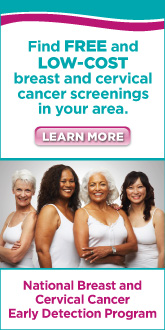Cancer Screening Tests
Screening means checking your body for cancer before you have symptoms. Getting screening tests regularly may find breast, cervical, and colorectal (colon) cancers early, when treatment is likely to work best.
Screening for Breast, Gynecologic, and Colorectal (Colon) Cancers
CDC supports screening for breast, cervical, and colorectal (colon) cancers as recommended by the U.S. Preventive Services Task Force.

Breast Cancer
Currently, mammograms are the best way to find breast cancer early, when it is easier to treat. For more information, visit Breast Cancer Screening.
Cervical Cancer
The Pap test can find abnormal cells in the cervix which may turn into cancer. Pap tests also can find cervical cancer early, when the chance of being cured is very high. For more information, visit Cervical Cancer Screening.
CDC's National Breast and Cervical Cancer Early Detection Program offers free or low-cost mammograms and Pap tests nationwide. Find out if you qualify.
Colorectal (Colon) Cancer
Colorectal cancer almost always develops from precancerous polyps (abnormal growths) in the colon or rectum. Screening tests can find precancerous polyps, so they can be removed before they turn into cancer. Screening tests also can find colorectal cancer early, when treatment works best. For more information, visit Colorectal Cancer Screening.
CDC's Colorectal Cancer Control Program provides access to colorectal cancer screening to low-income men and women aged 50–64 years who are underinsured or uninsured through programs in 25 states and four tribes.
Screening for Lung, Ovarian, Prostate, and Skin Cancers
Screening for lung, ovarian, prostate, and skin cancers has not been shown to reduce deaths from those cancers.
Lung Cancer
Scientists have studied several types of screening tests for lung cancer. A review of these studies by experts shows that more information is needed. It is not known if these tests can help prevent deaths from lung cancer. For more information, visit Lung Cancer Screening.
Ovarian Cancer
There is no evidence that any screening test reduces deaths from ovarian cancer. For more information, visit Ovarian Cancer Screening.
Prostate Cancer
CDC and other federal agencies follow the prostate cancer screening recommendations set forth by the U.S. Preventive Services Task Force, which recommends against PSA-based screening for men that do not have symptoms. For more information, visit Prostate Cancer Screening.
Skin Cancer
The U.S. Preventive Services Task Force has concluded that there is not enough evidence to recommend for or against routine screening (total-body examination by a clinician) to detect skin cancers early. For more information, visit Skin Cancer Screening.
Contact Us:
- Centers for Disease Control and Prevention
Division of Cancer Prevention and Control
4770 Buford Hwy NE
MS K-64
Atlanta, GA 30341 - 800-CDC-INFO
(800-232-4636)
TTY: (888) 232-6348
8am–8pm ET
Monday–Friday
Closed on Holidays - cdcinfo@cdc.gov




